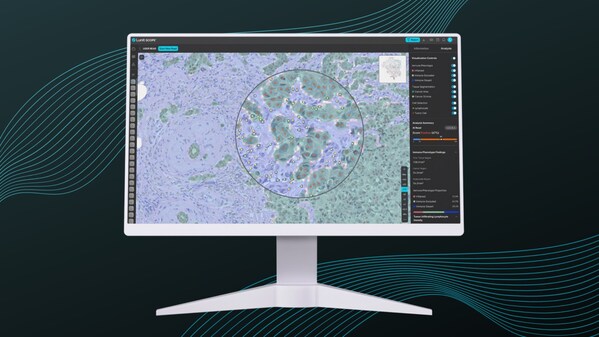 |
SEOUL, South Korea, Sept. 3, 2024 /PRNewswire/ -- Lunit (KRX:328130.KQ), a leading provider of AI-powered solutions for cancer diagnostics and therapeutics, today announced that Lunit SCOPE IO® has demonstrated significant potential in predicting immunotherapy response for patients with advanced biliary tract cancer (BTC), via AI-powered analysis of immune phenotype and tumor-infiltrating lymphocytes (TILs). The groundbreaking study, conducted in collaboration with researchers from Asan Medical Center and Severance Hospital in Seoul, Korea, was recently published in Clinical Cancer Research (CCR), an AACR journal.

Lunit's AI-powered tool for immune phenotyping and tumor-infiltrating lymphocytes analysis, Lunit SCOPE IO, has demonstrated its potential in predicting immunotherapy response for patients with advanced biliary tract cancer. (image credit: Lunit)
BTC is known for its poor prognosis, with limited treatment options available. While recent studies have shown promise in combining immunotherapy, such as anti-PD-1 inhibitors with standard chemotherapy, there has been a lack of effective predictive tools to guide treatment decisions.
The study analyzed pre-treatment pathology samples (H&E slides) from 339 patients with advanced BTC who received anti-PD-1 monotherapy as second-line or later treatment. Using Lunit SCOPE IO, researchers performed a detailed analysis of the tumor microenvironment, classifying patients' immune phenotypes into three categories: inflamed (high intratumoral TIL), immune-excluded (low intratumoral TIL and high stromal TIL), and immune desert (low TIL overall). Immune phenotypes are an emerging pan-cancer biomarker with support from leaders of the immuno-oncology community.[1]
Key findings include:
Notably, this study suggests immune phenotyping can serve as a predictive biomarker for possible response to immunotherapy in BTC, addressing a long-standing gap in personalized treatment approaches for this class of cancers with a high unmet need.
"Lunit SCOPE IO represents a significant advancement in the precision medicine landscape for cancer treatment," said Brandon Suh, CEO at Lunit. "By providing a deeper understanding of the tumor microenvironment, particularly immune phenotyping, our AI technology empowers clinicians to make informed treatment decisions, identifying patients most likely to benefit from immunotherapy and opening new avenues for personalized treatment strategies in challenging cancer types."
About Lunit
Founded in 2013, Lunit is a medical AI company on a mission to conquer cancer. We harness AI-powered medical image analytics and AI biomarkers to ensure accurate diagnosis and optimal treatment for each cancer patient. Our FDA-cleared Lunit INSIGHT suite for cancer screening serves over 3,500 hospitals and medical institutions across 50+ countries.
Our clinical studies have been published in top journals, including the Journal of Clinical Oncology and the Lancet Digital Health, and presented at global conferences such as the ASCO and RSNA. In 2024, Lunit acquired Volpara Health Technologies, setting the stage for unparalleled synergy and accuracy, particularly in breast health and screening technologies. Headquartered in Seoul, South Korea, with a network of offices worldwide, Lunit leads the global fight against cancer. Discover more at lunit.io.
[1] The cancer-immunity cycle: Indication, genotype, and immunotype, Immunity, 2023: Link
[2] Inflamed immune phenotype predicts favorable clinical outcomes of immune checkpoint inhibitor therapy across multiple cancer types, JITC, 2024: Link